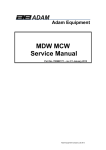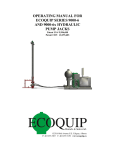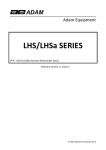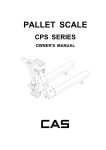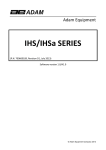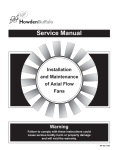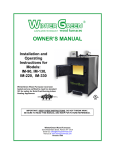Download Rice Lake DI-28SS Specifications
Transcript
DI-28SS Limited Warranty Rice Lake Weighing Systems (RLWS) warrants that all RLWS equipment and systems properly installed by a Distributor or Original Equipment Manufacturer (OEM) will operate per written specifications as confirmed by the Distributor/OEM and accepted by RLWS. All systems and components are warranted against defects in materials and workmanship for two (2) years. RLWS warrants that the equipment sold hereunder will conform to the current written specifications authorized by RLWS. RLWS warrants the equipment against faulty workmanship and defective materials. If any equipment fails to conform to these warranties, RLWS will, at its option, repair or replace such goods returned within the warranty period subject to the following conditions: • Upon discovery by Buyer of such non-conformity, RLWS will be given prompt written notice with a detailed explanation of the alleged deficiencies. • Individual electronic components returned to RLWS for warranty purposesmust be packaged to prevent electrostatic discharge (ESD) damage in shipment. Packaging requirements are listed in a publication, “Protecting Your Components From Static Damage in Shipment,” available from RLWS Equipment Return Department. • Examination of such equipment by RLWS confirms that the non-conformity actually exists, and was not caused by accident, misuse, neglect, alteration, improper installation, improper repair or improper testing; RLWS shall be the sole judge of all alleged non-conformities. • Such equipment has not been modified, altered, or changed by any person other than RLWS or its duly authorized repair agents. • RLWS will have a reasonable time to repair or replace the defective equipment. Buyer is responsible for shipping charges both ways. • In no event will RLWS be responsible for travel time or on-location repairs, including assembly or disassembly of equipment, nor will RLWS be liable for the cost of any repairs made by others. DI-28SS Bench Scale When Accuracy Counts Operation Manual THESE WARRANTIES EXCLUDE ALL OTHER WARRANTIES, EXPRESSED OR IMPLIED, INCLUDING WITHOUT LIMITATION WARRANTIES OF MERCHANTABILITY OR FITNESS FOR A PARTICULAR PURPOSE. NEITHER RLWS NOR DISTRIBUTOR WILL, IN ANY EVENT, BE LIABLE FOR INCIDENTAL OR CONSEQUENTIAL DAMAGES. RLWS AND BUYER AGREE THAT RLWS’S SOLE AND EXCLUSIVE LIABILITY HEREUNDER IS LIMITED TO REPAIR OR REPLACEMENT OF SUCH GOODS. IN ACCEPTING THIS WARRANTY, THE BUYER WAIVES ANY AND ALL OTHER CLAIMS TO WARRANTY. SHOULD THE SELLER BE OTHER THAN RLWS, THE BUYER AGREES TO LOOK ONLY TO THE SELLER FOR WARRANTY CLAIMS. No terms, conditions, understanding, or agreements purporting to modify the terms of this warranty shall have any legal effect unless made in writing and signed by a corporate officer of RLWS and the Buyer. © 2002 Rice Lake Weighing Systems, Inc. Rice Lake, WI USA. All Rights Reserved. RICE LAKE WEIGHING SYSTEMS • 230 WEST COLEMAN STREET • RICE LAKE, WISCONSIN 54868 • USA 74263 NOTES: [33] DI-28SS SERIES OPERATING MANUAL 8.1.3 Continued b. Accuracy Weighing: The scale weighing accuracy can be determined by applying various known weights to the platform. Because of the scale's very high accuracy, only weights that are certifiably more accurate than the scale's specifications should be used in testing for accuracy. (NBS class "F" or higher) Since the scale owner does not normally have such certifiable weights available to him, it is suggested that the customer call their authorized DIGI dealer. 8.2. Service & Repair No service or repair should be attempted except by qualified personnel, and not until it has been positively determined that the weighing scale requires such service. All service should be done in a clean, dry, dust-proof area. SECTION : : : : : : : Yel - Sig Grn +Sig Red +Ex Rs + +Sen Rs - Sen [32] Shld Shld PAGE NUMBER 1.0. GENERAL 1.1. Description 1.2. Warranty 2 2 3 2.0. SPECIFICATIONS 2.1. Platforms & Capacities 2.2. Technical 4 4 5 3.0. INSTALLATION 3.1. Unpacking 3.2. Inspection 3.3. Repackaging 6 6 6 6 4.0. ELECTRICAL TEST 4.1. Set-Up Procedure 4.2. Keyboard & Display Test 4.3. Control Panel 4.3.1. Lamps 4.3.2. Keys 7 7 7 8 8 8 5.0. OPERATION PROCEDURE 5.1. Power On 5.2. Tare Subtraction 5.2.1. One Touch Tare 5.2.2. Digital Tare 5.3. Battery Life Check 5.4. Set Point Value Entry 5.5. Changing Weight Units 9 9 9 9 9 10 11 12 6.0. PROGRAMMING 6.1. DI-28SS Key Function Summery 6.2. Internal Count 6.3. Set Up And Calibration 6.4. Specification List 6.5. Span Adjustment 6.6. Span Enable Switch 13 13 14 15 16-17 18-19 20 7.0. DI-20 OPTIONS 7.1. Battery Option 7.2. Set Point Output, & Setpoint Wiring 7.3. RS-232, RS-232 Wiring RS-232 Communication protocols 21 21 21-22 21 22-30 8.0. MAINTENANCE, CALIBRATION, TEST PROCEDURE, SERVICE 8.1. Maintenance Procedures 8.2. Service & Repair 8.3. Load Cell Wiring 31 L/C Connector Wht - Ex INDEX 31 32 33 [1] DI-28SS OPERATING MANUAL 1.0. GENERAL 1.1. Features The DI-28SS Indicator offers a practical solution to a wide range of weighing applications. There are a variety of weight capacities and increments available. The display resolutions selectable from 1/2000 to 1/10000. It features RS-232 & 4 Setpoint outputs (factory options) and keyboard calibration with auto-span. It operates on 6 “D” cell batteries or with its AC/DC adapter. The DI-28SS is able to support single load cells that have an output range of 0.4mV/V to 4.0mV/V and is able to support up to 4 load cells when used with the AC/DC adapter. This indicator features ON/OFF, REZERO, TARE, for both one touch and digital key operation. For a list of platforms sizes and available capacities see page 3. This instruction manual will provide the user with all the information necessary to understand, set-up and operate the DI28SS scale. Included in this manual are descriptions, specifications, drawings, and operating instructions. 8.0. MAINTENANCE, CALIBRATION, TEST PROCEDURE & SERVICE This section contains information and instructions concerning maintenance of the DI-28SS weighing indicator. Preventive maintenance consists of periodically cleaning the external surfaces of the instrument and should be performed as often as operating conditions warrant. The calibration procedure is designed to be an aid in maintaining the scale accuracy within specifications. The calibration procedure may also serve as a performance test procedure. CAUTION: DO NOT ATTEMPT ANY SERVICE WHILE THE INSTRUMENT IS CONNECTED TO THE POWER LINES. 8.1. Maintenance Procedures 8.1.1. Exterior Maintenance The exterior surfaces of the weighing scale can be easily cleaned using soap and water. However, extreme caution should be used so that there is no possibility of water penetration into the scale electrical or mechanical sections. A damp cloth or sponge is suggested. NEVER USE ACETONE, MEK, OR SIMILAR SOLVENTS ON THE PLASTIC HOUSING AS THEY WILL ETCH THESE SURFACES. For grease or other difficult spots, a chlorothane or naphtha based cleaner may be used. Never use any solvents on the front or rear panels. [2] [31] [30] [3] 2.0. SPECIFICATIONS This section includes a detailed listing of all pertinent specifications and parameters for each of the DI-28SS weighing scales. The system weighing accuracy is 0.02 % for all models and they meet or exceed the requirements of OIML Class III and NIST Handbook, Number 44. 2.1 Model S-XL S-SL S-TL S-UL S-PL bench bench / floor floor floor floor S-PL floor Platforms The following is a list of platforms : Platform Size/Platter 12” x 14” x3” 13” x 17” Capacities 1 LB. 5 LB. 10 LB. 60 LB. 150 LB. 17” x 21” 24” x 28” 30” x 30” 36” x 36” 48” x 48” 48” x 72” 60” x 60” 60” x 84” 150 LB. 150 LB. 25 LB. 50 LB. 300 LB. 300 LB. 500 LB. 300 LB. 500 LB. 1000 lb. to 3000 lb. 1000 LB. 1000 LB. 2500 lb. to 25000 lb. Ramps , Other Capacities And Stainless Steel Platforms Also Available Choosing A Capacity :Decimal Location (*) Minimum Weight (*) Display Resolution (=) Capacity Decimal Location 0.0000 0.000 0.00 0.0 0 Minimum Weight 1 2 5 Display Resolution 1 / 2000 1 / 2500 1 / 3000 1 / 5000 1 / 6000 1 / 7500 1/10000 Available Capacities 1lb,2.5lb,3lb.,5lb.,6lb,. 10lb.,25lb.,30lb.,50lb., 60lb.,75lb.,100lb.,125lb 150lb.,200lb.,250lb., 300lb.,375lb.,500lb., 600lb.,750lb.,1000lb., 1500lb.,2000lb.,2500lb. 3000lb.,3750lb.,5000lb. 6000lb.,7500lb.,10000lb Example: dec. loc. (*) min. wt. (*) disp. res. = avail cap. 0.00 (*) 5 (*) 1 / 7500 = 375. 00 lb. * Units can be programmed to primarily weigh in lb., oz., kg., g., or dwt. [4] [29] 2.2. SPECIFICATIONS Technical 2.2.1. Id Plate : Model # DI-28SS Serial # Power Dissipation .3w Voltage Battery size D 6x1.5v or 12v AC Adapter 2.2.2. Operating Conditions : Power source : AC/DC adapter (12V, Digi Model PS-100 only, or 6x 1.5V size D battery, alkaline or rechargeable. Temperature Range : Humidity : Power Consumption : -10° to +40° C. 15% to 85% R.H. 0.3 to 1.5 Watts. 2.2.3. Display Specifications Display Device: LCD (Liquid Crystal Display) Character Height, 25mm. No. of Digits: 6 Digits (including minus sign digit) [28] [5] INSTALLATION This section provides the information required for installation of the DI-28SS weight indicator. The following steps accomplish installation. 1. Unpacking 2. Set-up Procedure 3.1. Unpacking Each component of the DI-28SS is packed in a specially designed carton. Remove each component from the carton, separate the component from its polystyrene shell assembly and set aside. Inspect the carton interior to be sure that all accessories have been removed from the carton. Inspect the carton inner panels for accessories. ii) Manual method (SPEC 59 Bit 2 is 1) No handshaking (SEPC 52 bit 3 is 0) Press [ ↑ ] key to send data. PC DI - 28 TEXT NOTE: Be sure to repack all materials within the carton set. Store the cartons in a secure area so they can be available whenever shipment of the scale is required. 3.2. Inspection Immediately after unpacking, a visual inspection of the instrument should be performed. If any damage has been incurred during transportation the shipper and DIGI AMERICAS should be notified immediately. Instructions for assessment of damage and further procedures will then be determined. 3.3. Repackaging If, at anytime, the DI-28SS weight indicator must be returned for modification, calibration, or repair, be sure that it is properly packed with sufficient cushioning materials. Whenever possible, the original carton assembly should be retained for this purpose. Any damage caused by improper packaging will not be covered by warranty. [6] [27] Options (continued) 4.0. ELECTRICAL TEST 7.4.5. Communication Method 4.1. Set-up Procedure This part of the procedure is used to verify proper operation of the scale. Connect the AC power source, and press the [ON/OFF] key. At turn-on, the display will momentarily show the version number then, all digits from 0 to 9 in a “count-up” mode. Then the display will blank, show all “8’s”, and enter the regular operating display. There are three methods of sending the data : i) Stream - Send the data immediately ii) Manual - Send the data when [↑] is pressed using handshaking or no handshaking protocol. iii) Command - Send data when ACK code is received from remote system using handshaking or no handshaking protocol. i) Stream method (SPEC 59 Bit 2 is 0) This method will sending the data immediately. PC If at any time the scale displays erratic data, it may be caused by a power transient. Turn the scale “off” and momentarily unplug it from the wall outlet. Then restart, by plugging the scale back in and pressing the [ON/OFF] key. 4.2. Keyboard and Display This part of the procedure is used to verify proper operation of various switches and displays. The following functions will be tested in this procedure: A. Tare Entry B. Digital Tare Entry 4.2.1. One Touch Tare a. Press [REZERO] key, to rezero the scale. b. Place the empty container on the scale and press the [TARE] key once. The Weight Display should now read zero with the empty container on the scale. DI - 28 TEXT 4.2.2. Digital Tare Entry a. Press the [REZERO] key. After resetting, the display will resd zero. b. Enter the number 0.2 by using the keyboard, select the digit to change using [ ← DIGIT ] key, then press [ ↑ INCR ]key for the desired Tare value. Then press the [TARE] key. The Weight Display will show the weight entered with a negative sign indicating that the weight displayed is a Tare Weight. [26] [7] (a) Header Send As Text 4.3. Control Panels S S T O X H 4.3.1. Keys Key O T Name ON/OFF Functions Turn power on or off. REZERO Reset the weight to zero. TARE Enter or clear tare value. DIGIT SELECT Select the digits to set tare or setpoint value. INCREASE Increase the value of tare or setpoint weight on selected digit when setting data. Manual transmit key for RS-232 output. 4.3.2. Lamps Indicators Name BATTERY LAMP On when weight is stable at zero point. NET LAMP On when tare is subtracted. g GRAM LAMP On when grams are used as weighing unit. lb/kg LB/KG LAMP On when pounds are used as weighing unit. NET [8] W E I G H T : - 0 1 . 2 3 0 C T 0 R A R E 0 0 . 4 5 0 C L R F W E I G H T : NOTE: ✍ Net Weight and Tare Weight excluding a sign are transmitted shifting to the right. ✍ When it is minus data (0x2D) or plus data (0x30), net and tare weight data are transmitted setting 2DH or 30H into the left most byte of each 7 byte data block. ✍ In case of over weight, the data will transmitted as follows: 0 OV 00000 CR 4??????? CR LF ✍ Decimal points are transmitted as[ , ] comma 0x2C or [ . ] Period 0x2E (See Spec 01 bit 3) Functions On when battery becomes too weak and needs to be replaced/ recharged. ZERO LAMP O C N R E T [25] 5. Operation Procedure Options (continued) 7.4.4. RS-232 Communication Protocols 7.4.4.1. STX* 5.1 Power On PROCEDURE Connect DI-28SS to power supply. Text Format Stable flag CR *Header 1 1 1 * Options set in Spec. 1 Net weight CR *Header 7 1 1 Tare weight 7 CR LF 1 1 Stable flag Stable Unstable Data SOH (01H) NUL (00H) Header Net weight Tare As Code 0 (30H) 4 (34H) As Text NET WEIGHT : TARE WEIGHT : Text Text 0~9 . , - Ver0.01 1. Make sure nothing is on the platform, and press [ON/OFF] key. 000000 888888 0.000 Data 30H ~ 39H 2EH 2CH 2DH 0 1 . 2 Show Software Version Segment check starts. Ready for weighing PROCEDURE KEY OPERATION DISPLAY INDICATOR 0 ♦ 0.000 e.g. 0.010 kg 0.010 0.000 T NET ♦ -0.010 ♦ ♦ Note 1) To clear the tare weight, remove tare from the load receptor then, press[TARE] key. 5.2b Digital tare entry (When the tare weight is known) (a) Header Send As Code - REMARKS 5.2 Tare Subtraction 5.2a One touch tare Stand-by status 1. Place tare weight on the platform. 2. Press [TARE] key. 0 3. Remove the tare weight. Example: Net Weight = - 1.20 lb. Tare Weight = 0.45lb. PROCEDURE 3 0 C 4 R 0 0 0 . 4 5 0 C L R F KEY OPERATION INDICATOR 0 ♦ NET ♦ ♦ t00.0”0”0 , t00.0”2”0 , the value. 3. Enter the tare value. DISPLAY 0.000 Stand-by status 1. Move cursor to the left two digits. 2. Set tare value by increasing [24] DISPLAY * Header (Send as code or text depend on SPEC 53 bit 0) Stable Flag S S C 0 T O R X H KEY OPERATION -0.020 T Note 1) To clear the tare weight, press [TARE] key. Note 2) “0” and “2” means that the cursor is blinking. [9] 5.3. Battery Life Check Options (continued) The battery life can be checked PROCEDURE Stand-by status 1. Press [TARE], [ ], [TARE] key while pressing [REZERO] key. 2. Press [TARE] key to beback to weighing mode. KEY OPERATION DISPLAY 0.000 0 + T , INDICATOR 0 ♦ NET , T T 0.000 ♦ The number of boxes in the display indicates the battery power. When batteries are fully charged, 6 boxes appear. As the battery is running out of power, the number of boxes will decrease gradually. [10] 7.4.3. Spec Setting SPEC 52 Bit 2 0 No Send STX before text 1 SPEC 52 Bit 3 0 No Handshaking for RS232 output 1 Yes SPEC 53 Bit 0 0 No Send Header as text 1 Yes Yes SPEC 53 Bit 1 RS232C data sending method 0 Send immediately 1 After data is stable SPEC 53 Bit 2 0 Without header RS232 data format 1 With header SPEC 53 Bit 3 Stable flag in RS232C 0 Without stable flag 1 With stable flag SPEC 54 Bit 0, 1 and 2 000 1200 001 2400 RS232C baud rate 010 4800 100 011 SPEC 54 Bit 3 0 Disable RS232C output 1 Enable SPEC 55 Bit 0 0 7 bit RS232C data length 1 SPEC 55 Bit 1 0 1 bit RS232C stop bit 1 19200 9600 8 bit 2 bits SPEC 55 Bit 2 and 3 00 No parity 01 RS232C parity bit Odd 10 SPEC 59 Bit 0 and 1 00 1 sec 01 3 sec RS232C time out error 10 5 sec 11 10 sec SPEC 59 Bit 2 0 Stream Stream / Manual method 1 Manual SPEC 59 Bit 3 0 Disable Remote trigger for RS232C 1 Enable Even [23] SETPOINT Interface 5.4 Setpoint Value Entry PROCEDURE An external voltage is needed to drive the devices like relays or LEDs. The external voltage can go up to a max. 30V DC depending on the device requirements, or a Vcc voltage, 5V DC, can be used on PIN 8 as an external voltage. 7.2.2. Spec Setting SPEC 52 Bit 0 Set point control 0 Disable 1 Enable SPEC 52 Bit 1 Set point output 0 Active high 1 The state where no set point is reached. Set Point 1_ 4. Enter Setpoint 2 value by using [ ] and [ ] keys. External + 0 + , 6. Enter Setpoint 3 value by using [ ] and [ ] keys. Set Point 3 Set Point 4 + lb , 00.000 0 02.000 , , 00.000 0 03.000 , , , 0 00.000 04.000 8. Enter Setpoint 4 value by using [ ] and [ ] keys. External NET g ♦ 01.000 7. Store the data. When set point 1 is reached, the relay at set point 1 will be on (eg. 1 kg.) INDICATOR , 5. Store the data. Set Point 2 Set Point 1_ 1. Enter the setpoint entry mode by pressing [ ] three times while pressing [RE-ZERO] key. 0.000 00.000 3. Store the data. 7.2.3. How Set Points Work DISPLAY 0 Stand-by status 2. Enter Setpoint 1 value by using [ ] and [ ] keys. Active low KEY OPERATION Set Point 2 9. Store the data. Set Point 3 When set point 2 is reached, the relays at set point 1 and set point 2 will be on (eg. 1 kg and 2 kg.) Set Point 2 Set Point 3 Set Point 4 0.000 ♦ Note: To exit from setpoint entry mode without storing the data, press [TARE] key instead of [RE-ZERO] key. Set Point 4 Set Point 1_ 0 + External [22] [11] 7.0. OPTIONS 7.1. Battery Options 5.5. Changing Weight Units (kg , g , lb) PROCEDURE Stand-by status 1. Allow user to switch between KG, g and lb. (Assuming scale is calibrated in KG.) 2. To switch to g Press [REZERO] key and hold followed by [ ] then release [REZERO] 3. To switch to lb Press [REZERO] key and hold followed by [ ] then release [REZERO] 4. To switch to kg Press [REZERO] key and hold followed by [ ] then release [REZERO] KEY OPERATION DISPLAY 0.000 0 ♦ NET g lb The DI-28SS may be used with an A/C adapter or with batteries for portable operation. The indicator requires 6 x 1.5V size D battery. Alkaline or rechargeable batteries may be used. 5.000 Interface (Ex. 5kg) 7.2. SETPOINT Interface 4 setpoint signal can be output though Setpoint connector 5000 0 INDICATOR + Method: 24V Open Drain CMOS 4 S e t p o i n t S i gn a l O u t p u t ♦ (Ex. 5000g) 11.023 0 + 7.4. RS-232C Interface RS-232C serial data output. The data transaction method can be set for continuous output, manual (by key entry), or command(Inquiry from an external device). ♦ (Ex. 11.023lb) Protocol Baud Rate: 1200/ 2400/ 4800/ 9600/ 19200 Start Bit: 1 bit Stop Bit: 1/ 2 bit Data Bit: 7/ 8 bit Parity Bit: Even/ Odd/ None 5.000 0 + (Ex. 5kg) Text Command CR (0DH) The end of data LF (0AH) The end of text 0 - 9 (30H-39H) Numeric data (2DH) Minus . (2EH) Decimal Point STX (02H) Start of Text SOH (01H) Weight stable flag NUL (00H) Weight un-stable flag P/S-100 RS-232 & Set-point L/C Connector : : : : : : : : : : : : : : : : : : ª x T x d R x d G n d S p 1 S p 2 S p 3 S p 4 2 4 V G n d W h t Y e l G r n R e d S hl d R s + R s - [21] [12] 6.6. Span Enable Switch Check This Mode Is Provided To Check The Status of The Span Switch. The SPAN SWITCH is on the main board near the pre-amp housing and is labeled JP 1. See Figure on Page 19. Accessing Mode 1. Press and hold down the [REZERO] key. 2. While holding , press the[TARE] key, the [← ← DIGIT] key, the [← ← DIGIT] key. 3. Then release the [REZERO] key. When Calibration is enabled Display Shows : S- ON PROGRAM MODE DI-28SS Key Function Summary KEY REZERO TARE ← DIGIT ↑ INCREASE INTERNAL COUNT REZERO (D D T) REZERO EXIT ---- CHANGE MODE OPERATIONAL SPECS REZRO (D D D) STORE & INCREMENT SPEC EXIT INPUT 0 INPUT 1 W & M SPECS REZERO (D T D) STORE & INCREMENT SPEC EXIT INPUT 0 INPUT 1 SPAN ADJUSTMENT REZERO (D T T) STORE / RDY FOR CAL EXIT SELECT DIGIT INCREASE NUMBER SET POINT PROGRAMMING REZERO ( I I I ) STORE & INCREMENT SET POINT EXIT SELECT DIGIT INCREASE NUMBER SPAN SWITCH STATUS REZERO (T D D) ---- ---- ---- ---- BATTERY LIFE CHECK REZERO ( T D T) ---- EXIT ---- ---- D = ←DIGIT [20] I = ↑INCR T = TARE [13] 6.2. Internal Count This function is provided to check the internal count value from the A/D (pre-amp) To Enter Internal AD Count Mode 1. Press and hold down the [REZERO] key. 2. While holding , press the [← ← DIGIT] key two times, the [TARE] key once. 3. Then release the [REZERO] key. 6.5.2. Calibration Procedure PROCEDURE 1. Enter calibration mode. [REZERO] key [TARE] key Used to rezero the internal counts Remarks Press and hold [REZERO] key while pressing [DIGIT], [TARE], [TARE] then release [REZERO] key. 1 [↑ ↑ INCR] | 2 [REZERO] [ 00.000 ∇ [← ←] [ ↑ ] [ ↑ ] [↑][↑][↑] [↑] [ 06.000 ∇ [REZERO] 〈 06.000 ∇ [← ←] [ ↑ ] [ ↑ ] [↑][↑][↑] [↑] 〈 02.000 ∇ Press [DIGIT] once and [↑ ↑ INCR] key six times. (Ex. 2KG) [REZERO] CAL 0 Press [REZERO] to advance through calibration 5. Set zero point. [REZERO] CAL SP 6. Place weight on platter from step 4. [REZERO] xxxxxx When calibration is complete scale shows internal count. 7. Exit internal count mode. [TARE] xx.xxx Press [TARE] key to return to weighing mode. 8. Rezero scale place weight on scale to test calibration. [REZERO] 2. Enter the minimum display. 3. Enter the capacity weight. Used to exit from internal count mode 4. Enter weight to be used for calibration. (If other than capacity.) [14] DISPLAY 888888 | In This Mode, Each Key Functions As Follows [↑ ↑ INCREASE] key Used to switch between internal count and A/D Raw Data KEY OPERATION [REZERO] [← ← DIGIT] [TARE] [TARE] Press [↑ ↑ INCR] key. (Ex. 0.002) Press [REZERO] to advance through calibration Press [DIGIT] once and [↑ ↑ INCR] key six times. (Ex. 6KG) Press [REZERO] to advance through calibration [19] 6.5.1. Span Adjustment This Mode Is Provided To Calibrate Scale Accessing Calibration Mode 1. Press and hold down the [REZERO] key. 2. While holding , press the [← ← DIGIT] key, the [TARE] key, the [TARE] key. 3. Then release the [REZERO] key. In This Mode, Each Key Functions As Follows [↑ ↑ INCREASE] key [← ← DIGIT] key [REZERO] key [TARE] key Used to increase value of digit Used to change digits as needed Used to save changes and advance through calibration Used to exit calibration mode without saving changes 6.3. Set Up And Calibration 6.3.1. Specification Change Function key for spec. change. Accessing Operational Specs. (50 – 59) 1. Press and hold down the [REZERO] key. 2. While holding , press the [← ← DIGIT] key three times . 3. Then release the [REZERO] key. In This Mode, Each Key Functions As Follows [← ← DIGIT] key [↑ ↑ INCREASE] key [REZERO] key [TARE] key Used to input 0 Used to input 1 Used to save the specification and increment to the next specification Used to exit from specification mode THE SLEEP TIMER IS LOCATED IN OPERATIONAL SPECS. Spec.50 = sleep timer ( 0000 = none to 1111 = 15 min. ) 6.3.2. Specification Change (Continued) Function key for spec. change. Accessing Weights & Measures Specs. (00 – 09 / 20 – 29) 1. Press and hold down the [REZERO] key. 2. While holding , press the [← ← DIGIT] key, the [TARE] key, the[← ← DIGIT] key. 3. Then release the [REZERO] key. In This Mode, Each Key Functions As Follows [← ← DIGIT] key [↑ ↑ INCREASE] key [REZERO] key [TARE] key [18] Used to input 0 Used to input 1 Used to save the specification and increment to the next specification Used to exit from specification mode [15] 6.4. DI- 28 Specification List 6.4.1. DI - 28 W & M Specs. W & M SPECS. PRESS AND HOLD REZERO THEN PRESS (D - T - D) Spc. No. Spec. 00 Spec. 01 Spec. 2 Spec. 3 Spec. 04-09 Spec. 20 Spec. 21 BIT 3 BIT 2 Comma or Dec. Pt. 0 =comma, 1= dec.pt. BIT 1 Not Used BIT 0 00 = no dec.pos. 01 = one dec.pos. 10 = two dec.pos. 11 = three dec.pos. Not Used Change Weight Units 0 = no, 1 = yes Scale Type 0 = kg , 1 = lb Internal Count When Span SW off 0 = no, 1 = yes Not Used Tare Accumulate 0 = no,1 = yes One Touch Tare Clear 0 = no,1 = yes Spec. 52 Not Used Rezero In Tare 0 = no, 1 = yes Digital Tare 0 = no, 1 = yes Tare Limit 0= 50%, 1 = 100% Not Used Spec. 53 Not Used Spec. 54 Not Used 0000 = 4.00mV/V 0001 = 3.75mV/V 0010 = 3.50mV/V 0011 = 3.25mV/V Spec. 25 Not Used load cell sensitivity (mv/V) 0100 = 3.00mV/V 1000 = 2.00mV/V 0101 = 2.75mV/V 1001 = 1.75mV/V 0110 = 2.50mV/V 1010 = 1.50mV/V 0111 = 2.25mV/V 1011 = 1.25mV/V Not Used Ignore Span Switch 0 = no, 1 = yes Spec. 29 Spec. 51 Not Used Spec. 22-23 Spec. 24 Spec. 26-27 Spec. 28 OPERATIONAL SPECS. PRESS AND HOLD REZERO THEN PRESS (D - D - D) Spc. No. Spec. 50 Decimal Point Position Not Used 6.4. DI - 28 Specification List (Continued) 6.4.2. DI - 28 Operational Specs. 1100 = 1.00mV/V 1101 = 0.80mV/V 1110 = 0.70mV/V 1111 = 0.60mV/V Recall Zero 0 = no, 1 = yes Not Used Not Used Minus Weight 0 = 9 ext. increments, 1 = No Limit Zero Reset Range 0 =± 10% , 1 =± 100% Re-Zero Range 0=±2%,1= ± 100% Spec. 55 Spec. 56-58 Spec. 59 BIT 3 0000 = None 0001 = 1 Min. 0010 = 2 Min. 0011 = 3 Min. Not Used Handshaking for RS-232 0 = no, 1 = yes RS-232 Stable Flag 0 = without flag 1 = with stable flag RS - 232 Output 0 = Disable 1 = Enable Parity 0 0 = no parity BIT 2 0100 = 4 Min. 0101 = 5 Min. 0110 = 6 Min. 0111 = 7 Min. BIT 1 Sleep Timer 1000 = 8 Min. 1001 = 9 Min. 1010 = 10 Min. 1011 = 11 Min. Motion Detection 0 = strong , 1 = weak Set Point Output 0 = active low, 1= active high Non-Stable Output 0 = no, 1 = yes Power Save 0 = no, 1 = yes Send STX Before Text 0 = no,1 = yes RS-232 Data Format 0 = without header 1 = with header 0 0 0=1200 bps 0 1 1=9600 bps 0 1 = odd 1 0 = even Baud Rate 0 0 1 = 2400 bps 1 0 0 = 19200 bps Stop Bit 0 = 1 bit 1 = 2 bits BIT 0 1100 = 12 Min. 1101 = 13 Min. 1110 = 14 Min. 1111 = 15 Min. Animal Mode 0 = no, 1 = yes Set Point 0 = disable, 1 = enable Send Header As Text 0 = no, 1 = yes 0 1 0 = 4800 bps Data Length 0 = 7 bits 1 = 8 bits Not Used Remote Trigger 0 = Disable 1 = Enable Communicatio n Mode 0 = stream 1 = manual RS-232 Time Out 0 0 = 1 sec. 0 1 = 3 sec. 1 0 = 5 sec. 1 1 = 10 sec. Not Used [17] [16]


















